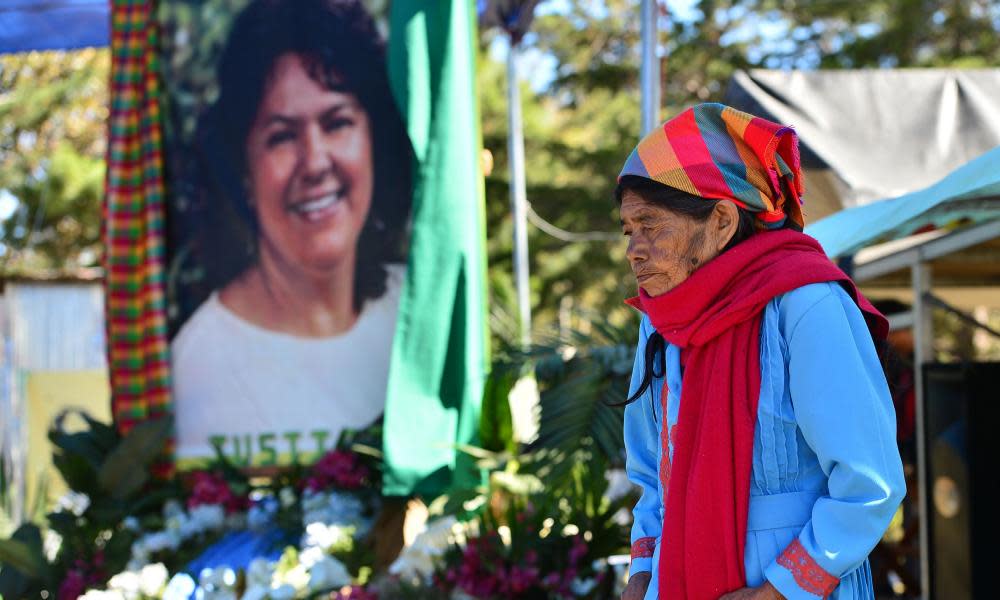Berta Cáceres was exceptional. Her murder was all too commonplace

Fifty-one months ago today Berta Cáceres was gunned down by hired assassins at her home in western Honduras. Cáceres was an indigenous leader, a political radical and a grassroots human rights defender who dedicated her life to resisting the patriarchal neoliberal world order and fighting for environmental justice. She was smart, kind, provocative and a rare leader who could listen, negotiate and bring people together. She was killed less than a year after winning the prestigious Goldman environmental prize for leading a campaign to stop construction of an internationally funded hydroelectric dam on a river considered sacred by the indigenous Lenca people. She died way too young, at only 44, at a time when our world’s indigenous peoples and natural resources are under sustained attack from unsustainable greed and consumption. The race to save the planet is on, but radical changes are needed and time is running out. Her death was a crime against her family, the Lenca people, Honduran society and humanity. Fifty-one months ago today, the world lost a rare leader.
Related: Who killed Berta Cáceres? Behind the brutal murder of an environment crusader
Cáceres was exceptional, but her murder was not. Honduras is one of the most violent countries in the world; in 2009, a military-backed coup ushered in an authoritarian pro-business political party, which has since been accused by Honduran prosecutors of deep-seated corruption, and implicated by American prosecutors in drug trafficking and money laundering. The nightmare which has unfolded over the past 11 years has forced hundreds of thousands of men, women and children to flee a toxic mix of poverty, dire public services, corruption, gang- and state-sponsored violence. They risk kidnap, extortion, rape and even death at the hands of criminal gangs and corrupt state forces as they travel 1,500 or so miles overland through Mexico in hopes of reaching the United States. Like migrants and refugees from neighbouring Guatemala, El Salvador and Mexico, those fleeing Honduras are looking for safety, prosperity and dignity, but what they find is an increasingly hostile country willing to violate international and national laws to keep them out.
The Trump administration has used the Covid-19 pandemic as a pretext to issue a legally sketchy total ban on migrants and refugees at US land borders. The one thing the US does not seem willing to do is withdraw economic and political support from the post-coup ruling political party in Honduras. US policies for Central America have long been contradictory, and that’s certainly true today. Meanwhile, in Honduras, the pandemic has been used to crack down on civil liberties, with reports that indigenous and rural communities considered hostile to the government are being denied basic food aid.
Cáceres’s murder triggered international condemnation but failed to stop the bloodshed. At least 25 land and environmental defenders have been murdered in Honduras since 2 March 2016. Latin America remains the most dangerous region in the world to defend land and rivers from megaprojects like mines, dams, fracking, logging and biofuel cash crops, which are almost always licensed without proper consultation or compensation. Between March 2016 and November 2019, 340 defenders were killed in the Americas, according to Global Witness, a not-for-profit group. These high-impact, targeted assassinations go largely unpunished. Impunity breeds more violence.
We cannot talk about 'clean' energy while communities like those Cáceres defended are militarised and displaced
Generally, assassination is the macabre finale in a campaign that also includes intimidation, defamation, threats, attempted bribes, assault and, increasingly, judicial persecution. The use of laws and policies designed to tarnish, criminalise and intimidate defenders, their families and communities is rising and often takes place under the murky cloak of national security. Invariably, the institutions of state security – police, army, prosecutors and judges – are employed to protect economic interests over citizens’ rights. For example, since September 2019, seven subsistence farmers from Guapinol, Honduras, where the community is trying to block construction of an iron ore mine which threatens to contaminate local rivers, have been detained on trumped-up charges. At least four others have fled Honduras and sought asylum in the US to avoid the same fate. And so the merry-go-round of misery keeps turning.
Dams, solar, wind and other renewable energy sources must replace our reliance on dirty fossil fuels. Although the green energy revolution is undeniably urgent, however, we cannot talk about “clean” energy while communities like those Cáceres defended are militarised and displaced, and while community leaders continue to be jailed and killed. The green energy revolution must be economically and environmentally just; indigenous and rural communities in Honduras, Colombia, Canada, India and the Philippines cannot be collateral damage.
In a country where more than 80% of murders go unsolved, one exceptional thing about the assassination of Berta Cáceres is that justice has been – partially – served. Seven people – the hired hit squad and some middlemen – were convicted and sentenced. But focusing solely on the material authors in such high-impact crimes is “insufficient to combat impunity and is problematic, as it does not identify powerful groups which may be behind human rights violations”, according to Michel Forst, the former UN special rapporteur on the situation of human rights defenders.
The masterminds – those who paid, ordered, enabled and benefited from her murder – have not been held accountable. The struggle for genuine justice will be long.
Nina Lakhani is an environmental justice reporter at the Guardian US. Her book Who Killed Berta Cáceres? Dams, Death Squads, and an Indigenous Defender’s Battle for the Planet will be published by Verso Books on 2 June


